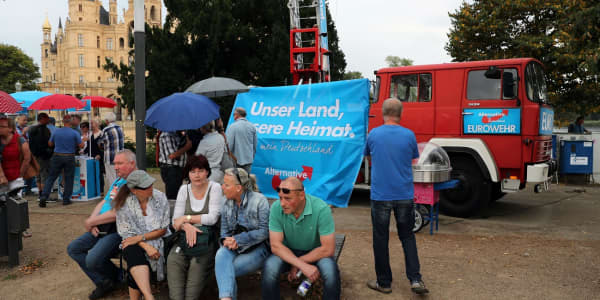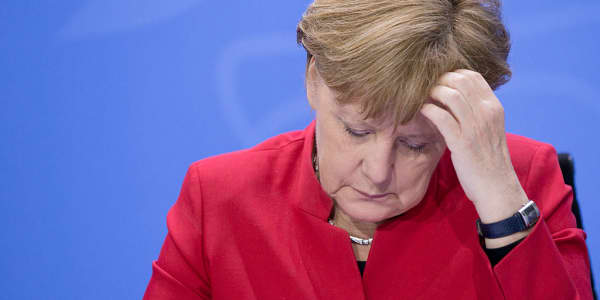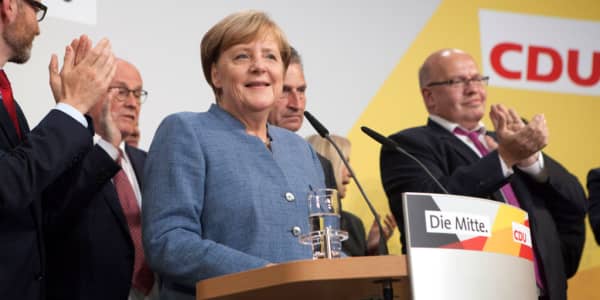German Chancellor Angela Merkel said she wants proper talks to begin with other political parties in order to form a coalition government, but differences over immigration, climate change and euro zone reforms remain obstacles to forming a new alliance.
Merkel called Monday for proper talks between her conservative Christian Democratic Union (CDU) and Christian Social Union (CSU) alliance, the liberal Free Democratic Party (FDP) and the Green Party to begin within the next 10 days.
In a video message on Facebook, Merkel said that she wanted exploratory talks to end on November 16 and for proper negotiations to begin that could conclude with a coalition being formed, Reuters reported. Merkel alluded to the warring parties and their different priorities in the video:
"For me it is clear that on the subject of finances the question is how we can use the room for maneuver (in the budget) so that everybody can have their priorities implemented while at the same time ensure that we have a balanced budget," Merkel said.
The specter of the far-right also loomed over the election with the Alternative for Germany (AfD) party gaining enough votes to enter the German parliament, the Bundestag, for the first time.
Exploratory talks have taken place between Merkel's Conservative bloc, the Greens and the FDP (to try to form a "Jamaica coalition," so named because of the colors of the political parties involved) but the latter two parties have blamed each other over a lack of progress.
The obstacles
The Greens and pro-business FDP parties are not natural bedfellows with marked differences over climate policy, immigration and reforms for the euro zone.
While the Greens want to see 100 percent renewables in the energy sector by 2030, a more open immigration system for refugees and asylum seekers and more European integration, by contrast the FDP wants tighter controls on immigration, rejects plans for more financial integration in the euro zone and has said that modern coal plants are "indispensable for the foreseeable future."
There are also differences between the parties over defense spending (the Greens wanting less, the FDP more) and taxation (the Greens wanting tax rises for higher earners, the FDP would like to see tax cuts).
It's not all bad news. The one thing the parties seem to agree on is public spending, with all parties agreeing that infrastructure spending needs to be increased. There could also be an agreement over the creation of an immigration law that would see create clearer rules and definitions of political refugees and economic migrants. The FDP has advocated a points-based system like that seen in Canada.
The Green Party Chairperson Simone Peter has been critical of the FDP's position on climate policy and migration, commenting that the FDP were "playing into the hands of climate change deniers" and that the its tougher stance on immigration amounted to "populist platitudes."
Meanwhile the leader of the FDP, Christian Lindner, has hit back, saying that there is no use rushing talks just to form a coalition government "that is not stable and constantly argues."
Speaking to the Berliner Morgenpost newspaper Sunday, Lindner said that a coalition would not come to fruition just "because everyone is exhausted and has to find a way to come together." He gave the chances of a Jamaica coalition (so named because of the party colors involved) at 50-50 and said his party was not afraid of a new election should talks fall apart.
Fractious relations between Merkel's potential coalition partners puts the chancellor in a difficult situation but there is little choice given that her main opposition party, the Social Democratic Party, has chosen to not enter a coalition.
In her video message Monday, Merkel addressed the main issues of contention, saying that Germany had signed up to "challenging goals for 2020" with regards to climate change that "are not so simple to meet." She added that "especially important for us is the issue of immigration and integration," adding that "these will be difficult issues."
Despite the challenges facing Merkel and her colleagues, analysts believe that a government will be formed before the end of the year.
Beat Wittmann, partner and chairman for Porta Advisors, agreed that differences over the euro zone budget, defense spending and climate change would be "pragmatically bridged."
"All the party leaders 'owe' it to their respective constituencies that they spend the maximum feasible time to negotiate," he told CNBC on Tuesday.
Carsten Nickel, managing director for Europe at risk consultancy Teneo Intelligence, echoed that view, telling CNBC on Tuesday that he believed the parties could compromise and overcome their differences. "There's a lot of political pressure to see an agreement and I think they'll achieve that before Christmas," he said.
Although the combination of parties in a coalition is an as-yet untested one, Nickel said the parties represented a very centrist coalition "and that's not necessarily a negative thing."
"In fact, if a government is formed that will be a success in itself," he said, "as it will show that the political system in Germany can deliver on political change and can renew itself."






